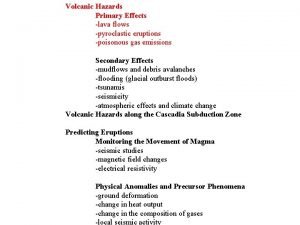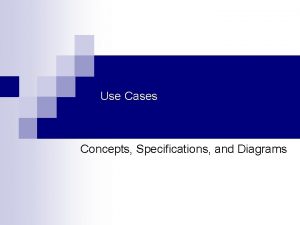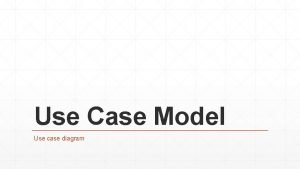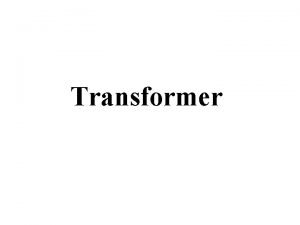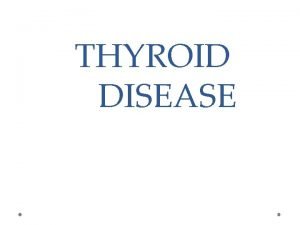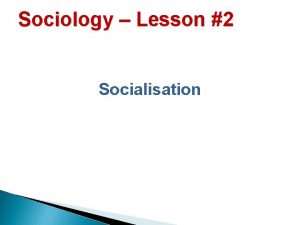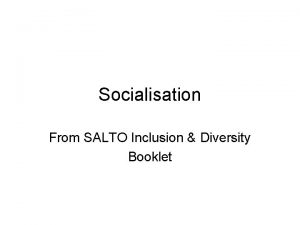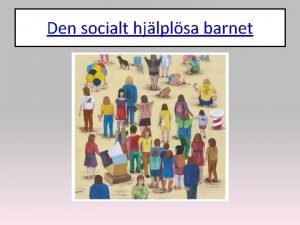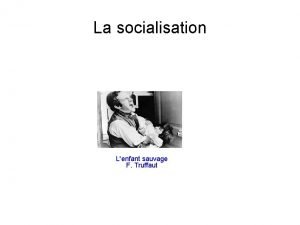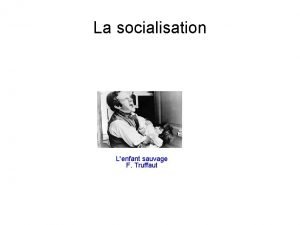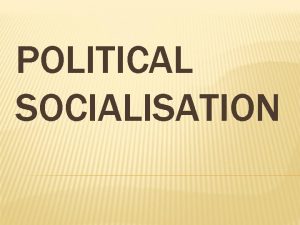Socialisation Primary and Secondary Agencies Agencies of Socialisation








- Slides: 8

Socialisation Primary and Secondary Agencies

Agencies of Socialisation: Family Behaviour For most people, the family is a hugely-influential form of primary 1. socialisation Family that impacts on behaviour throughout their lives: children, for example, are subject to the socialising and controlling of adults, while adult family relationships also involve 2. behaviours Peer Group socialisation processes that control parental behaviours. Norms Basic family norms involve things like such as how to address family members (Mum, Dad), when, where and how to eat and sleep, the meaning of “good” and “bad” behaviour, who children can and cannot associate with and the like. Behaviour 3. Education Roles 4. Although Workplace there a relatively limited number of family roles learn (such as husband, 5. to. Media wife, brother, sister, teenager so forth) these may have 6. and Religion an intensity and longevity not found in most of the other 7. roles Endwe play. Roles Sanctions Most family sanctions are informal because the “rules of family life” tend to be unwritten. Positive sanctions range from verbal approval (“You are such a good boy / girl”) to physical rewards such as gifts. Negative sanctions are also wide-ranging – from SHOUTING to physical punishment. Norms Exit Sanctions Values Parents are usually significant others – people who’s opinions we respect and value – and they are influential in shaping both our basic (such as manners) and moral values (such as the difference between right and wrong). We may also, of course, value “The Family” as an institution in society.

Agencies of Socialisation: Peer Group Behaviour Our peers shape our attitudes, feelings and actions, both 1. directly Familyand indirectly – the former in terms of our immediate peer group (primary) and the latter comparatively: use. Group our peers as a reference group (secondary 2. we Peer socialisation) against which to compare ourselves with others. Norms As in any social group there a multitude of norms we could identify. One example is ageappropriate behaviour; it is not the norm for young children to smoke or buy alcohol. Similarly different peer groups may have different normative concepts of appropriate clothing. Behaviour 3. Education Roles 4. We. Workplace play a variety of peer- related roles in a variety of 5. situations Media– from friends, through acquaintances to in the workplace. 6. colleagues Religion Roles Norms Exit 7. End Sanctions These are rarely formal and positive sanctions range from approving gestures and language to seeking out your company. Informal negative sanctions involve things like refusing to speak to you, rejecting your friendship and physical violence. Sanctions Values As with norms, these can be many and varied. Immediate peer group values may involve things like friendship. , loyalty and social support. Wider values might involve things like fashion, gender identities and academic achievement.

Agencies of Socialisation: Education Behaviour This secondary socialisation agency impacts on our behaviour in a range of ways, from teaching the skills and 1. Family knowledge required for adult life to providing a sense of history and national identity. The school is also a place 2. Peer Group where we “learn to limit our individual desires”: to think about the feelings and needs of others, for example. Behaviour 3. Education 4. Workplace Roles Successful socialisation into the 5. education Mediasystem involves understanding formal roles such 6. as teacher, Religion student, support staff and the like. Each of these is governed by a range of 7. roles End formal and informal rules… Roles Sanctions Positive sanctions include grades, qualifications and prizes, as well as praise and encouragement. On the negative side, there are sanctions like detentions and exclusions and a failure to achieve academic qualifications. Norms Exit Sanctions Values Norms A range of norms apply specifically within the school, such as wearing a particular uniform, the daily need to attend a requirement to address teachers / students in particular ways. Further norms involve things like learning some subjects (but not others), homework, tests, obeying teachers and the like. Values Schools project a range of values, some technical (pupils should work hard to achieve qualifications) and some social - things like individual competition for academic rewards, teamwork (especially in sports), conformity to authority (such as not questioning what is being learnt or why) and achievement on the basis of your merits. Schools may also value “academic ability” more highly than “practical ability”.

Agencies of Socialisation: Workplace Roles Two major workplace roles are those of employer and 1. employee, Familyalthough each may involve a range of sub-roles, such as different types of employee: professional workers, as lawyers or teachers, have higher levels of status, 2. such Peer Group responsibility, freedom of action (autonomy) and the like than a zero-hours contract worker. Behaviour 3. Education Behaviour The workplace may be one of the first places we, as adults, interact with other adults. It has primary socialising elements, in terms of things like friendship formation and interaction, and also secondary characteristics: our behaviour is also influenced by workplace hierarchies and personal experience of class, age, gender and ethnic inequalities. 4. Workplace 5. Media Roles Norms 6. Religion Exit 7. End Sanctions Employers have a range of positive sanctions at their disposal, such as pay increases, giving their workers more personal freedom, responsibility and control over others. Negative sanctions include disciplining, demoting or sacking someone. Sanctions Values Norms We expect to be paid for working (although some types of work, like housework and voluntary work, don’t involve money). Norms relating to things like attendance, punctuality and obedience to superiors also apply here. Values One workplace value is payment: we should get money in exchange for working. Lessobvious values include things like competition and the belief hard work and competence should be rewarded by promotion, increased responsibility, control over the working environment and so forth.

Agencies of Socialisation: Media Roles In general terms, examples of media roles might producers (such as a newspaper or website 1. include Family owner), consumer (we all play this particular role) and, more-recently with the development of social media, 2. producer-consumers: Peer Group people who produce the content they then consume. Behaviour There is evidence of indirect long-term media effects on our behaviour, through things like agenda-setting (determining how or if something will be debated) or repeated exposure to ideas and images across a range of topics – from news, to politics to sexuality. 3. Education 4. Workplace 5. Media Roles Norms 6. Religion Exit 7. End Sanctions The media exercises social control through the publicity given to behaviour of which publishers approve or disapprove. Positive sanctions involve the approving portrayals and language, whereas negative sanctions similarly involve criticism and unflattering portrayals. Sanctions Values Norms The media – from newspapers and magazines through film and television to the Internet – are a rich source of normative information covering every aspect of human behaviour. Values The media is a potentially powerful force in terms of supporting or marginalising certain values. It has, for example, a (loud) voice in debates over nationality (what it means to be “English”, for example). It also has the ability to promote certain values and devalue others: many English newspapers have a strong “anti-European Community” stance, for example.

Agencies of Socialisation: Religion Roles Organised religions (such as 1. Christianity Familyor Islam) have a range of roles (Priest, Imam, 2. devotee…). Peer Group Some religions, such as Jehovah Witnesses demand members perform a 3. their Education proselytizing role (actively trying non-members) while 4. to convert Workplace in other forms (some New Age Religions, for example) a 5. customer Mediarole is played. Behaviour Roles Norms 6. Religion Exit 7. End Sanctions The power of positive and negative sanctions probably turns on the extent to which you are a believer in the god – or gods – being promoted. Positive sanctions involve ideas like going to Heaven or being reincarnated after death, while negative sanctions may involve ideas about Hell or excommunication from a Church. Behaviour For non-members religion generally plays a peripheral role in most people’s life. Indirectly, however, religions play an important socialising role in terms of both influencing general social values and performing certain ceremonial functions (such as marriages, christenings and funerals). Sanctions Values Norms In mainstream organised religions norms may involve things like prayer, attending services, ministering to the poor and the like. In some sects or cults, loyalty to the group or leader may be a normative demand. Values Many of our most important moral values (fundamental beliefs about right and wrong) have been influenced in some way by religious values: the “ 10 Commandments” in Christianity, for example, are reflected through our legal system.

Short. Cutstv www. shortcutstv. com © 2019
 Agencies of secondary socialisation
Agencies of secondary socialisation Primary and secondary effects of a tectonic hazard
Primary and secondary effects of a tectonic hazard Impact of business decisions on stakeholders
Impact of business decisions on stakeholders Primary pollutants and secondary pollutants
Primary pollutants and secondary pollutants Pinotubo
Pinotubo Use case primary and secondary actors
Use case primary and secondary actors Pengertian include dan extend
Pengertian include dan extend Auto transformer vs transformer
Auto transformer vs transformer Thyroid storm tsh levels
Thyroid storm tsh levels




